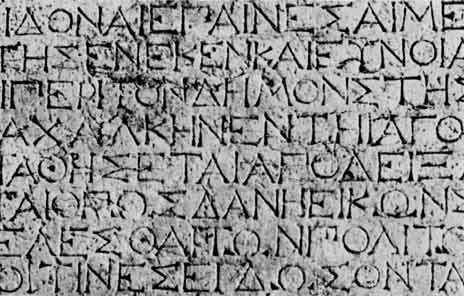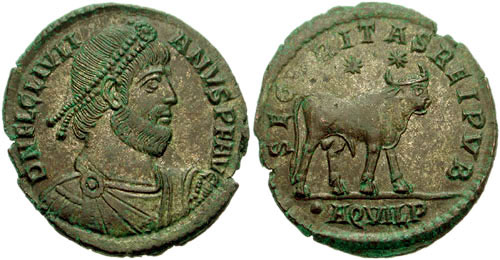8.16.2006
GoTo the Beach. Take Along the Classics
>

If you are headed to the beach (we're not...because we are working to keep up our whopping 30% growth over last month, July) then might I suggest taking along some lighthearted summer reading according to Slate.
How about the Loeb Classical Library The volumes are thick and won't bend. At the same time, they are small-spined and fit into a bag for the beach along with SPF 50 lotion and sunglasses. They contain the original languages: Greek on the left page, and an obtuse English translation on the right; vice-versa for Latin.


Start with Homer and end with St Jerome, Augustine of Hippo, or Ammianus Marcellinus.
Throw in Petronius'Satyricon and the description of Trimalchio's ribald dinner party as the equivalent of Desperate Housewives
Augustine attempted to transmigrate the collapsing Roman world and urbs roma into the urbs dei the great city of God in heaven. By this time civic service, like serving on a city council, became a financial burden since imperial revenue officers held local notables accountable for the assessed taxes...any discrepancy between the popular collection and the imperial quota had to made up by these individuals. By the year 330 almost 1% of the population of the Empire was in arms, with a field army of several hundred thousand men, vast numbers of 2nd tier local troops (limitanei) and also barbarian auxilaries, whilst inflation, famine, unending warfare and disease removed the incentive to invest in new projects. The cities declined as the notables fled to their country estates for good, and erected fortifications. The idea of the great city with public works became a concept related to a heavenly ideal, since reality was almost unbearable for the urban aristocrats.

Julian (361-363 A.D.)
Ammianus, as a senior army officer, has much to say about warfare, invasions, the guerilla tactics of the enemy, limits of power and a detailed digression on Iraq's climate, canals between the rivers, and species of palm trees, almost in the style of a web blog: eyewitness, factual reporting.
Of the tribes of the Euphrates:
"The (Saracens) are led by tribal chieftains, each having authority over his clan. If a wrong is done to a member of a clan by another, they will lay aside all to avenge the cause of the wrong, even a generation later."
Of the climate:
"Our men were not used to the heat, the flies, and the giant insects; moreover, our wily foe chose the hottest time of the day to attack, inured as they were from birth to such a condition."
Of the Persian Cataphracts, or heavy-cavalry entirely encased in steel:
He is the main source for the Emperor Julian, for whom he served as a senior army staff officer. He is probably the last great historian writing in Latin, with his history being composed around the year 390 A.D.
If you get that far, that would be almost at volume 500.
How about the Loeb Classical Library The volumes are thick and won't bend. At the same time, they are small-spined and fit into a bag for the beach along with SPF 50 lotion and sunglasses. They contain the original languages: Greek on the left page, and an obtuse English translation on the right; vice-versa for Latin.


Start with Homer and end with St Jerome, Augustine of Hippo, or Ammianus Marcellinus.
Throw in Petronius'Satyricon and the description of Trimalchio's ribald dinner party as the equivalent of Desperate Housewives
Augustine attempted to transmigrate the collapsing Roman world and urbs roma into the urbs dei the great city of God in heaven. By this time civic service, like serving on a city council, became a financial burden since imperial revenue officers held local notables accountable for the assessed taxes...any discrepancy between the popular collection and the imperial quota had to made up by these individuals. By the year 330 almost 1% of the population of the Empire was in arms, with a field army of several hundred thousand men, vast numbers of 2nd tier local troops (limitanei) and also barbarian auxilaries, whilst inflation, famine, unending warfare and disease removed the incentive to invest in new projects. The cities declined as the notables fled to their country estates for good, and erected fortifications. The idea of the great city with public works became a concept related to a heavenly ideal, since reality was almost unbearable for the urban aristocrats.

Julian (361-363 A.D.)
Ammianus, as a senior army officer, has much to say about warfare, invasions, the guerilla tactics of the enemy, limits of power and a detailed digression on Iraq's climate, canals between the rivers, and species of palm trees, almost in the style of a web blog: eyewitness, factual reporting.
Of the tribes of the Euphrates:
"The (Saracens) are led by tribal chieftains, each having authority over his clan. If a wrong is done to a member of a clan by another, they will lay aside all to avenge the cause of the wrong, even a generation later."
Of the climate:
"Our men were not used to the heat, the flies, and the giant insects; moreover, our wily foe chose the hottest time of the day to attack, inured as they were from birth to such a condition."
Of the Persian Cataphracts, or heavy-cavalry entirely encased in steel:
) "All the companies were clad in iron, and all parts of their bodies were covered with thick plates, so fitted that the stiff joints conformed with those of their limbs; and forms of the human faces were so skillfully fitted to their heads, that since their entire bodies were covered with metal, arrows that fell upon them could lodge only where they could see a little through tiny openings opposite the pupil of the eye, or where through the tips of their noses they were able to get a little breath."
He is the main source for the Emperor Julian, for whom he served as a senior army staff officer. He is probably the last great historian writing in Latin, with his history being composed around the year 390 A.D.
If you get that far, that would be almost at volume 500.

